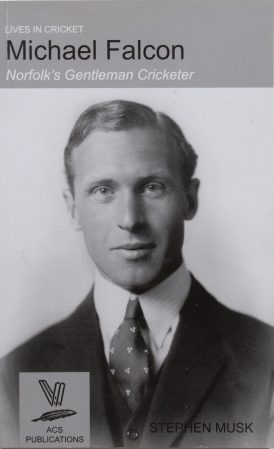Michael Falcon: Norfolk’s Gentleman Cricketer
Martin Chandler |Published: 2010
Pages: 152
Author: Musk, Stephen
Publisher: ACS
Rating: 3.5 stars

Given that the legendary Sydney Barnes very briefly threw in his lot with Warwickshire, before spending three summers in the Lancashire side, there can be little argument as to Michael Falcon being the best English cricketer never to have played for a First Class county.
Despite that apparent handicap Falcon did still manage to play in as many as 89 First Class matches. Many of those appearances were for Cambridge University, and twenty more for the famous wandering club, The Free Foresters, but the real indication of Falcon’s quality as a cricketer was that despite his background in Minor County cricket he was selected to play for the Gentlemen against the Players as many as fourteen times, three of those occasions at Lord’s, a fixture that in Falcon’s time was as prestigious as a Test match.
In terms of his cricket Falcon began as a batsman, and during his early years, including the first three when he was at Cambridge, he barely bowled at all. From 1911 onwards however he became a highly effectively opening bowler. Not quite of express pace he was still genuinely sharp and his ability to swing the ball brought him many wickets. His batting faded with time, although Falcon was always considered an all-rounder, and he was also a fine captain who led Norfolk for many years and indeed into the 1946 season, during which he turned 58!
The question must therefore be as to what other aspects of Falcon’s life persuaded him that he did not wish to play his cricket for one of the First Class counties given that, unsurprisingly, he would not have been short of options had that been a route he chose.
The Falcon background was a fortunate one, his father being a successful businessman. As noted after being schooled at Harrow Falcon went up to Cambridge to read law and was to qualify as a barrister, a career which he pursued either side of the Great War. There are one or two stories from a legal career that ultimately did not last beyond the early 1920s, albeit in later life Falcon returned to the law by becoming a magistrate.
Like all of his generation Falcon’s life and career were interrupted by the Great War from which, despite seeing action at Gallipoli and in Palestine, he emerged unscathed as, remarkably given the huge losses sustained in that terrible conflict, did his two brothers.
On his return from military service Falcon combined politics with his legal career, being a successful conservative candidate in the 1919 and 1922 general elections before being defeated in 1923. Stories from Falcon’s time at Westminster are relatively few, Musk expressing the view, surely correctly, that Falcon was too agreeable a person to be suited to the cut and thrust of politics, and one suspects the same could be said of his legal career.
After leaving law and politics behind Falcon then went into brewing and insurance, investing in the former and being a non-executive director for many years in the well known Norwich Union insurance company (now part of Aviva). Like his cricket career Falcon’s life was a long one, his living on to 87 before passing away in 1976. I rather liked the story of his last words, correcting a doctor who did not know him as to the pronunciation of his surname. I have sympathy with the doctor concerned however as I have learnt that ever since I first knew of Falcon I have been making the same error.
Musk is a thorough researcher, and a decent writer so this was never going to be a bad book, but he had one priceless advantage when he set out on the project, that being the full co-operation of Falcon’s four surviving children. If that were not sufficient to lift his work well above the mundane he also had the opportunity to interview a man who played under Falcon, and an old friend from outside the game, so the story is a full one, and whilst there are numerous descriptions of cricket matches based on contemporary reports there is much else besides.
And what of the burning question? Was Falcon good enough to play for England? It is not an issue that Musk ducks and indeed the most interesting chapter of the entire book is devoted to that question. Naturally there are many contemporary quotes, and a full analysis of what Falcon did achieve in the game.
Entirely as he should Musk does make the point that Falcon’s record on his biggest stage, Gents v Players, is a slight weakness in the argument, but it is impossible to get away from that remarkable match at Eastbourne in 1921 when Archie MacLaren’s side of amateurs famously defeated Warwick Armstrong’s hitherto all-conquering Australians, Falcon’s 6-67 in the tourists’ first innings being the catalyst for the remarkable turnaround – surely in that summer at least Falcon should have been invited to play for England?
All in all Michael Falcon: Norfolk’s Gentleman Cricketer is another excellent title from the ACS Lives in Cricket series albeit, sadly, one long out of print that cannot now be purchased from the Association. That said if the book appeals, and you can’t find or can’t be bothered to scour the second hand market for a print copy, then an electronic copy is available via Googleplay






I still have a few copies of ‘Michael Falcon’ left. Should anybody wish to buy one, I can offer it at £10 (inclusive of British p & p).
Comment by Stephen Musk | 10:00am BST 12 June 2023